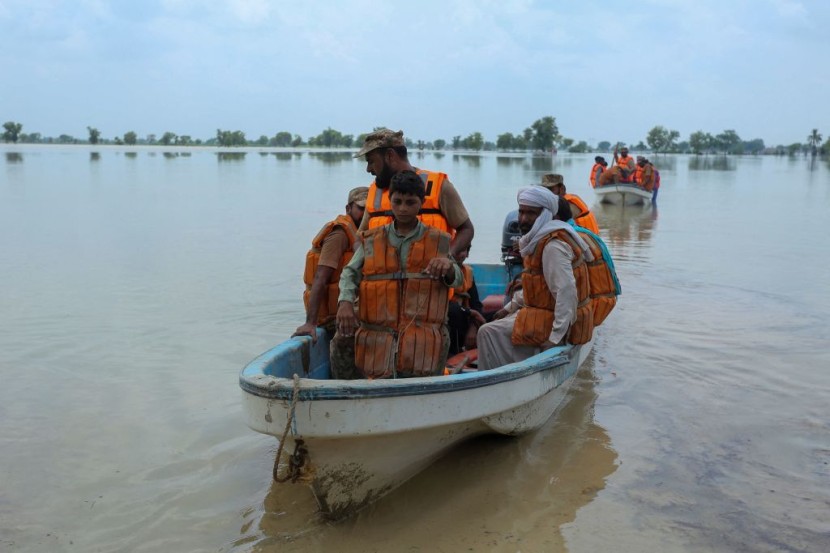
UN Secretary-General António Guterres warned on Tuesday that the world is sleepwalking into environmental disaster as he launched a $160 million flood relief appeal for flood-ravaged Pakistan.
In one of the country's worst monsoon seasons in almost a decade, more than 1,100 people were killed and 33 million were affected. Images of water flowing down streets, devouring communities, and demolishing bridges serve as a sharp reminder of the climate catastrophe' injustices, which disproportionately affect poor countries. Richer nations are also historically responsible for causing the problem in the first place.
UN Appeals for Emergency Funding After Deadly Floods in Pakistan
During a press conference on Tuesday, Pakistan's Prime Minister Shahbaz Sharif claimed he had never witnessed such destruction in his entire political career. He also warned that Pakistan will face food scarcity as a result of agricultural damage caused by the floods and that tomato and onion prices have skyrocketed.
According to the Germanwatch Global Climate Risk Index, Pakistan was the ninth most impacted country by climate change from 2000 to 2019. People living in hotspots such as South Asia are 15 times more likely to die as a result of climate change. The devastating floods are expected to envelop up to a third of the country by the conclusion of the monsoon season, claiming many lives but also wreaking havoc on crops throughout farmland amid a food crisis.
Shabnam Baloch, IRC's Pakistan country director, said that Pakistan produces less than 1% of the world's carbon footprint. A shortage of sanitation facilities and safe drinking water has increased the potential of disease outbreaks in flooded regions, with roughly 20,000 people in need of crucial food supplies and medical assistance, as per CNN.
Although the rain ceased three days ago and floodwaters have subsided in some parts, significant portions remain waterlogged. Rescue workers were evacuating people who had become stranded to safer ground, including makeshift tent camps that had sprouted up along highways, villages, and towns.
Official government estimates that the catastrophe has caused $10 million in economic loss; however, Ahsan Iqbal, the planning minister, has stated that this is a preliminary estimate and that the true cost would be much larger. The International Monetary Fund's executive board approved the disbursement of $1.17 billion on Monday as part of a rescue agreement struck between the IMF and Pakistan in 2019.
However, the release of a $1.17 billion tranche was halted this year as the IMF expressed worries about Pakistan's compliance with the conditions of the contract under Imran Khan's government. The United Nations this week granted $3 million to assist organizations and their partners to help them respond to the floods, with the funds going toward health, nutrition, food security, water, and sanitation services.
Sherry Rehman, Pakistan's climate minister, said on Monday that additional monsoons were expected in September. While monsoons are customary in the region at this time of year, officials say they arrived earlier than usual in Pakistan, according to Sky News.
Read Also: Chinese Authorities Charge 28 People in Viral Video of Brutal Attack on Women That Sparked Outrage
Hundreds of People Including Tourists Were Stranded in Pakistan Floods
A state-run disaster management agency said in a statement that almost 300 stranded individuals, including some tourists, were flown to northern Pakistan on Tuesday, while over 50,000 others were transferred to two government shelters in the northwest. General Qamar Javed Bajwa, Pakistan's army leader, visited the northern Swat valley and assessed rescue and relief activities, noting that "restoration will take a long, long time."
Prime Minister Sharif stated that the amount of aid needed to be rapidly multiplied, promising that every penny will reach the needy, there will be no waste at all. Sharif feared that the damage would further destabilize an already fragile economy, potentially leading to a severe food crisis and contributing to rising inflation, which peaked at 24.9% in July.
Wheat sowing might also be delayed, he added, adding that Pakistan was already in contact with Russia over wheat imports to reduce the damage. According to Akhtar Nawaz, at least 72 of Pakistan's 160 districts have been deemed catastrophe-hit, according to the head of the national disaster agency, as per Reuters via MSN.
Related Article: COVID-19 Omicron Vaccine: Here's When You Can Get New Booster Shot vs. Contagious Variant
@YouTube








